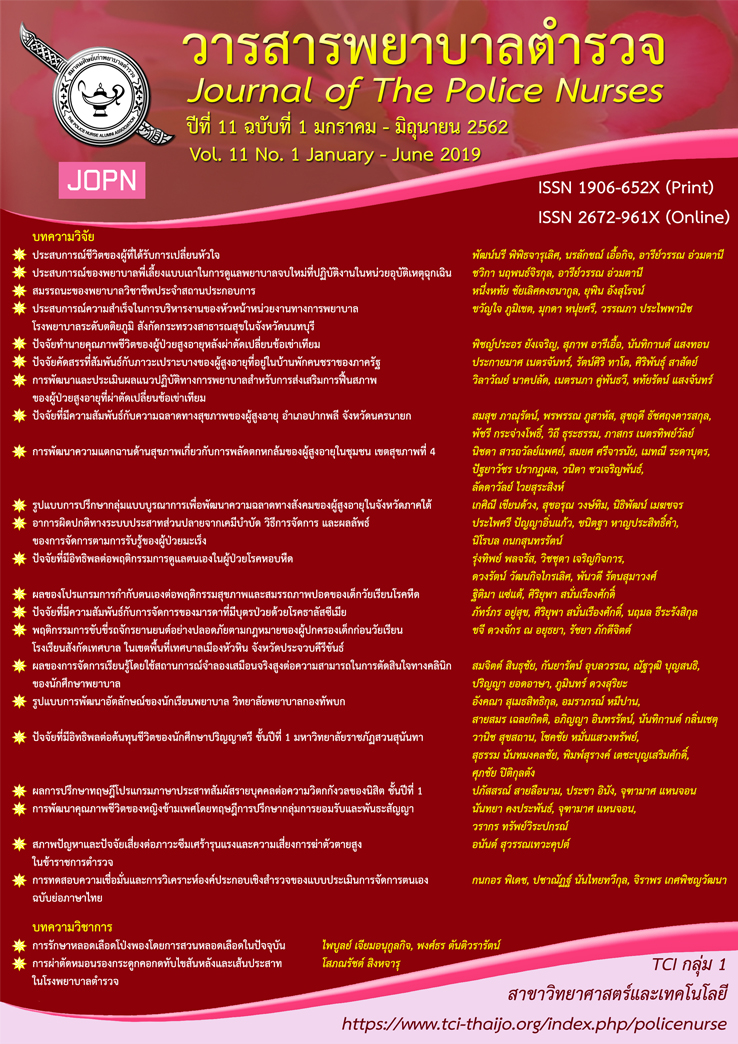FACTORS RELATED TO HEALTH LITERACY AMONG THE ELDERLY IN PAK PHLI DISTRICT, NAKHON NAYOK PROVINCE
Keywords:
health literacy, health behavior 3E 2S, elderlyAbstract
This study aimed to investigate the level of health literacy and relationship between personal characteristics, health behaviors 3E.2S., and health literacy among the elderly in Pak Phli District, Nakhon Nayok Province. The 465 elders were selected by using convenience sampling technique. Data were collected during November-December 2018, using health literacy and health behaviors 3E.2S. among people from age 15 years and above (2018 version) evaluation form of Health Education Section, Department, Ministry of Public Health. The data were analyzed using descriptive statistics and using Chi-Square and Spearman’s Rho correlation coefficient to test the relationship.
The results showed that 1) mean of the health literacies of subjects was 40.91. A half of the elderly were in the level of poor (50.30%). 2) The significant relationship was observed among health literacy and age, occupation (labor and those who are not at home), body mass index, people who have a status in the community, such as village health volunteer, members of the club group and the general people related to health literacy with statistically significant at the level of 0.05, while health behaviors 3E.2S. had positive relationships with health literacy (r = .251, p = .000).
These findings suggested that health providers should allocate the appropriate health information for the elderly with different levels of health literacy and personal characteristics.
Downloads
References
Kaeodumkoeng, K., & Tripetchsriurai, N. (2011). Health literacy. Health Education Division, Department of Health Service Support Ministry of Public Health, Bangkok.
Kaseampakdee, J., Theppasuit, S., & Sakea, P. (2015). The behavioral health 3E 2S among residents aged 15 years old and over in the area of health behavior in their own village in Phetchaburi province. Journal of Health Education and Communication, 1(1), 30-42.
Kobayashi, L. C., Smith, S. G., O’Conor, R., Curtis, L. M., Park, D., Wagner, C. V., . . . & Wolf, M. S. (2015). The role of cognitive function in the relationship between age and health literacy: A cross-sectional analysis of older adults in Chicago, USA. British Medical Journal Open, 5(4), e007222. doi:10.1136/bmjopen-2014-007222.
Nilnate, W. (2014). Health literacy in Thai elders in senior citizens club of Bangkok (Doctoral of Philosophy). Chulalongkorn University, Bangkok, Thailand.
Paibulsiri, P. (2018). Health literacy and health behaviors 3E2S of public sector executives, Phra Nakhon Si Ayutthaya province. Journal of Preventive Medicine Association of Thailand, 8(1), 97-107.
Pittaya, P. (2018). Health literacy and health behaviors 3E2S of public sector executives, Phra Nakhon Si Ayutthaya province. Journal of Preventive Medicine Association of Thailand, 8(1),97-107.
Sharif, I., & Blank, A. E. (2010). Relationship between child health literacy and body mass index in overweight children. Patient Education and Counseling, 79(1), 43-48. doi:10.1016/j.pec.2009.07.035
Srithanee, K. (2017). Relationship between health literacy and quality of the elderly's life at the central part of the North-East Thailand. Journal of health system research, 11(1), 26-36.
Suka, M., Odajima, T., Okamoto, M., Sumittani, M., Igarashi, A., Ishikawa, H., . . . & Sugimori, H. (2015). Relationship between health literacy, health information access, health behavior, and health status in Japanese people. Patient Education and Counseling, 98(5), 660-668. doi:10.1016/j.pec.2015.02.013.
The Center for Health Care Strategies. (2013). Health literacy fact sheets. Retrieved from https://www.chcs.org.
World Health Organization (WHO). (2009). Health literacy and health promotion definitions, concepts and examples in the Eastern Mediterranean region individual empowerment conference working document. Nairobi, Kenya.
Yamane, T. (1973). Statistics: An introductory analysis. New York, NY: Harper & Row.
Downloads
Published
How to Cite
Issue
Section
License
ผลงานที่ได้ตีพิมพ์แล้วจะเป็นลิขสิทธิ์ของวารสารพยาบาลตำรวจ



